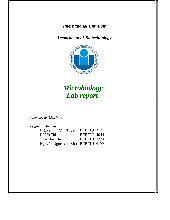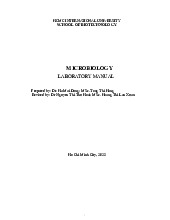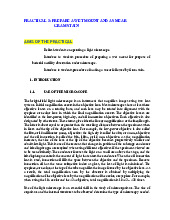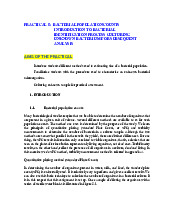


Preview text:
lOMoAR cPSD| 58504431 Semester:
Group number: Group members (Full name & ID): Lab Session:
MICROBIOLOGY LAB 3 REPORT
1. Why is the low-power objective placed above the stage when the microscope is stored or carried?
………………………………………………………………………………………………………………………………………………………………………… ………………
2. When will you use immersion oil to view with microscope and why?
…………………………………………………………………………………………………………………………………………………………………………
…………………………………………………………………………………………………………………………………………………………………………
3. List 2 purposes of heat-fixation step 1.
Adherence: the heat fixation helps the bacteria cells adhere firmly to the slide surface,
preventing them from being washed away during the subsequent staining steps. 2.
Cell permeabilization: The heat helps permeabilize the bacterial cell wall and cell membrane,
making the more accessible to staining dyes. Moreover, preventing them from moving or changing
shape during the staining process.
4. How does true motility differ from Brownian movement?
In true motility, the organism will actively change its position relative to its original starting point, as it is
using its flagella or other locomotive structure to propel itself through the environment.
In contrast, with Brownian movement, the small suspended particles will undergo rapid, random
movements, but on average, they will not significantly change their overall position from the original starting point
5. How would you define a properly prepared bacterial smear?
……………………………………………………………………………………………………………………………………………………………………………
…………………………………………………………………………………………………………………………………………………………………………… lOMoAR cPSD| 58504431
6. Name the reagents and state the purpose of use of each of the following in the Gram stain: a. Primary stain:
………………………………………………………………………………………………………………………………………………………………..
…………………………………………………………………………………………………………………………………………………………………………… b. Mordant:…….
…………………………………………………………………………………………………………………………………………………………………
…………………………………………………………………………………………………………………………………………………………………………… c. Decolorizer:
…………………………………………………………………………………………………………………………………………………………………….
……………………………………………………………………………………………………………………………………………………………………………
d. Counterstain:
……………………………………………………………………………………………………………………………………………………………….
…………………………………………………………………………………………………………………………………………………………………………… 7.
For Gram staining procedure, duration of decolorizer application to your bacterial smear is important
in getÝng correct result. Explain.
……………………………………………………………………………………………………………………………………………………………………………
……………………………………………………………………………………………………………………………………………………………………………
……………………………………………………………………………………………………………………………………………………………………………
…………………………………………………………………………………………………………………………………………………………………………… 8.
What part of bacteria cell is mostly involved in Gram stain?
………………………………………………………………………… 9.
Explain why Gram-negative can lose the stained color of crystal violet-iodine complex upon decolorization? lOMoAR cPSD| 58504431
……………………………………………………………………………………………………………………………………………………………………………
……………………………………………………………………………………………………………………………………………………………………………
……………………………………………………………………………………………………………………………………………………………………………
…………………………………………….. 10.
Why should you use young culture for Gram staining?
…………………………………………………………………………………………………………………………………………………………………………… ……………… 11.
What is meant by Gram variable?
…………………………………………………………………………………………………………………………………………………………………………… ……………… 12.
Draw Gram-stain results for 2 bacteria you observed under microscope. Include your label/annotation.



